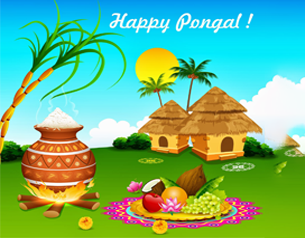
Pongal Festivals
Thai Pongal is a standout amongst the most critical celebrations celebrated by Tamil individuals in the Indian province of Tamil Nadu, the Indian Union Territory of Puducherry, and the nation of Sri Lanka, and additionally Tamils around the world, incorporating those in Malaysia, Mauritius, South Africa, United States, Singapore, Canada, and the UK. Thai Pongal compares to Makara Sankranthi, the collect celebration celebrated all through India.
HISTORY
The causes of the Thai Pongal celebration may date to over 1000 years back. Epigraphic prove recommends the festival of the Puthiyeedu amid the Medieval Chola realm days. Puthiyeedu is accepted to speak to the primary gather of the year. Tamil individuals allude to Pongal as "Tamizhar Thirunaal," the celebration of Tamizhs. Thai Pongal, likewise alluded to as Makara Sankranti, is alluded to in the great work of Hindu crystal gazing, the Surya Siddhanta.
PONGAL DISH
Other than rice and drain the elements of this sweet dish incorporate cardamom, raisins, Green gram (split), and cashew nuts. Cooking is done in daylight, more often than not in a yard or patio, as the dish is devoted to the Sun god, Surya. The cooking is done in a mud pot that is designed with shaded examples called kolam. Pongal has two variations, one sweet and one appetizing. The dish is served on banana takes off.
Cooking Pongal is a customary practice at Hindu sanctuaries amid any piece of the Temple Festival in Sri Lanka and Tamil Nadu.
DAYS OF CELEBRATION
Bhogi
The day going before Pongal is called Bhogi. On this day individuals dispose of old effects and celebrate new belonging. The transfer of exhausting things is like the customs of Holika in North India. The general population gathers at daybreak in Tamil Nadu to light a campfire so as to copy the disposes of. Houses are cleaned, painted, and enhanced to give a merry look. The horns of bulls and wild oxen are painted in towns. In Tamil Nadu agriculturists keep restorative herbs (neem, Avram, Sankranti) in the upper east corner of every field, to keep crops from sicknesses and nuisances.
Thai Pongal
The headliner, otherwise called Thai Pongal, happens on the second of the four days. This day agrees with Makara Sankranthi, a winter gather celebration celebrated all through India. The day denotes the beginning of the Uttarayana, the day of the Indic solstice when the sun purportedly goes into the tenth place of the Indian zodiac i.e. Makara or Capricorn.
In the Tamil dialect, the word Pongal signifies "flooding," connoting wealth and flourishing.
Maatu Pongal
Maatu Pongal is praised the day after Thai Pongal. Tamils view cows as wellsprings of riches for giving dairy items, compost, and work for furrowing and transportation. On Maatu Pongal, dairy cattle are perceived and managed warmly. Highlights of the day incorporate diversions, for example, the Jallikkattu and subduing bull.
Kanu Pidi is a convention for ladies and young ladies. Amid Kanu, Pidi ladies nourish flying creatures and appeal to God for their siblings' prosperity. As a major aspect of the "Kaka pidi, Kanu pidi" devour ladies and young ladies put a devour of shaded rice, cooked vegetables, banana, and sweet Pongal on ginger or turmeric leaves for crows to share and appreciate. Amid this time ladies offer petitions with the expectation that sibling sister ties remain always solid as they do in a crow family.
Kaanum Pongal
Kaanum Pongal, the fourth day of the celebration, denotes the finish of Pongal merriments for the year. The word kaanum in this setting signifies "to visit." Many families hold reunions on this day. Siblings pay exceptional tribute to their wedded sisters by giving blessings as certification of their obedient love. Landowners exhibit blessings of nourishment, garments, and cash to their occupants. Villagers visit relatives and companions while in the urban areas individuals rush to shorelines and amusement parks with their families. Celebrants bite sugar sticks and again enliven their homes with kolam. Relatives and companions get much obliged for their help supporting the gather.
